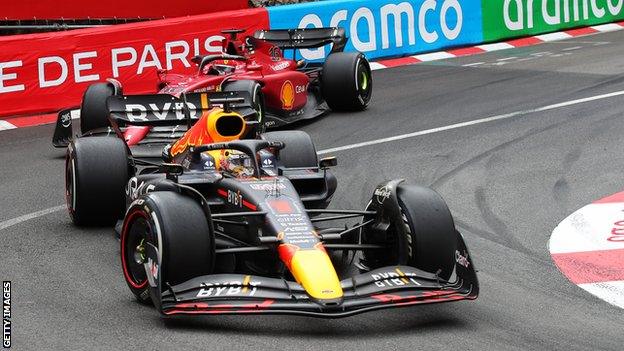Monaco Grand Prix: 'Too many mistakes' - how Ferrari lost out
- Published
- comments

Charles Leclerc led the race until a poorly timed pit stop allowed Perez to take his place
Charles Leclerc did not mince his words after Ferrari turned victory into defeat with a series of strategic errors during the Monaco Grand Prix.
"Let down is not the word," he said. "Sometimes mistakes can happen - but there have been too many mistakes today.
"I'm used to getting back home disappointed but we cannot do that, especially in a moment now where we are extremely strong.
"We need to take opportunities. I love my team. We will come back stronger, but it hurts a lot.
"We cannot afford to lose so many points like this. It's not even from first to second, it's from first to fourth because after the first mistakes we've done another one."
Leclerc's disappointment was on two different, but inter-related, levels.
First, he had just seen what should have been a comfortable victory in his home race slip through his fingers because of a series of strategic errors by the team.
Secondly, he had just lost yet more points to title rival Max Verstappen. Four races ago, Leclerc had a 46-point lead in the championship. Now, the Dutchman is nine points ahead, with Red Bull having won four races in a row.
Defeat from the jaws of victory
Red Bull should never have had a sniff of victory in Monaco. Ferrari had locked out the front row, giving them track position at a circuit where overtaking is close to impossible.
The rain at the start, allied to a series of confusing operational steps by governing body the FIA, complicated matters. But once Leclerc got away in the lead followed by team-mate Carlos Sainz, Ferrari should have been able to stay there - especially as Leclerc was pulling steadily away at the front, seemingly unchallengeable.
As the track dried in the opening stages, the correct strategy in their position would have been to stay on the extreme wet tyres on which they started the race until it was time to switch to slicks.
But after Red Bull pitted Sergio Perez for intermediate tyres, and started setting quick times, Ferrari responded with Leclerc two laps later. It was too late - when Leclerc came out of the pits, he was behind Perez, although still ahead of Verstappen.
At this point, Ferrari still had a chance to win - but not with Leclerc any more. Now Sainz was leading, after over-ruling Ferrari's call to bring him in for intermediates and saying he wanted to stay out and switch straight to slicks. This time, it was pure bad luck that undid them.
Sainz pitted for slicks five laps after Perez had pitted for inters. He would have kept the lead, but he encountered Nicholas Latifi's Williams on his lap out of the pits.
Sainz questioned why Latifi had passed him as the Ferrari came out of the pits rather than slotting in behind. Once he had, Sainz lost 1.5 seconds before he was able to pass the Williams - and Perez, who stopped on the next lap, came out only 0.8secs in front.
Leclerc's race, meanwhile, was going from bad to worse. Ferrari also stopped him for slick tyres on the same lap as Sainz - by mistake. They called him in and then told him to stay out, but it was too late; Leclerc was already in the pit lane.
Had he stayed out, he would have finished third, but the time lost in the pits and gained by Verstappen while still on track vaulted the Dutchman ahead.
"I don't understand what made us change our minds," Leclerc said. "We got undercut and then stuck behind Carlos [Sainz]. There were a lot of mistakes and we cannot afford to do that.
"The first [radio message for the first pit stop] was a clear decision and a very wrong one. From that moment onwards, the mess started.
"I don't know if it was panic - I don't hear all the background stuff between the team so it's not up to me to judge.
"The last message I had was not clear because I was told to come in and then to stay out but I was already in the pit lane and that's when I let it out on the radio and screamed because I knew it was done."
In short, Ferrari had lost Leclerc the lead by pitting him when they did not need to. Had he stayed out on extreme wets, he would have been in the lead, with Sainz and Perez behind him and with all three needing to stop for dry-weather tyres - a position from which a Leclerc win was very much possible.
Then, once the lead was gone, they called Leclerc again when again they should have left him out, with track position over Verstappen, again with both of them needing to stop once more.
"We made mistakes in our judgements," Ferrari team principal Mattia Binotto said. "We could have won the race today."
Why did it happen?
'It was a complex situation," Leclerc said, "and we will have quite a bit of meetings in the next days to understand that. It is a bit early to discuss that now."
Learn how to train like an F1 pro with Red Bull junior driver Juri Vips
Red Bull aggression pays off
Although Ferrari threw the race away, Perez drove superbly on the strategy Red Bull chose. And Verstappen's third place owed a fair bit to a very quick in-lap before his final stop. Third and fourth in the first stint had become first and third at the flag - and all because their aggressive choices had triggered errors from Ferrari.
"Charles in the early laps seem to have to things pretty much under control and had the buffer of his team-mate behind him as well," Red Bull team principal Christian Horner said. "At that point it looked like Ferrari had the race in the bag.
"I thought we might be able to get one of them. I didn't think we'd be able to get both of them. And obviously we capitalised on their mistake.
"It's a process but you have to have effective and clear communication and as a pit wall we had all the information and we were using the information well.
"We were debating whether to go straight from extreme to slick like Lewis [Hamilton] did [to win in 2016] but we decided going through the inter was quicker and the power of the out-lap was enormous. Checo absolutely nailed it."
"I've always prided ourselves on us being an attacking race team and we've always focused on doing the basics well. Whether it's strategy or pit stops, thinking on your feet, and today was all about thinking on feet and reacting to the situation facing you."
A scare after the race when Ferrari protested against both Red Bulls for crossing the pit-exit line after the second stops was only brief - both were rejected.
Questions over race management
The race was called after just 64 of the scheduled 78 laps as a result of a series of delays caused by the weather.
Many felt the race could have started on time given the rain was not too bad at that time, but race director Eduardo Freitas decided not to go ahead because he could see a huge downpour coming.
Better to wait for that to clear, he thought, than start the race, have it hit and then have to stop it, most likely after some kind of enormous accident.
After that, though, the teams had a series of questions as to his decision-making.
Why, they wondered, when you have to fit your tyres five minutes before the start, and it takes two minutes to fit the tyres on the grid, did the FIA give only a nine-minute warning that extreme wets would be required for the first attempt to start the race?
This led to 100 people running around like headless chickens trying to find tyres. Teams complained on safety grounds, and Freitas gave them an extra 10 minutes to prepare.
Then, at the second start, his call for extreme wets and a safety car start came 20 seconds after the cut-off time for tyres to be fitted. This did have an explanation - a power outage had affected the start lights, so the planned standing start had to be abandoned.
"It needs a bit of a review," Horner said. "It was a little chaotic with tyres coming on the grid, off the grid. It's a busy enough grid here and it's always a little dangerous to try and pre-empt the weather.
"You can argue it both ways. You can argue we would have been better starting the race and then reacting to the downpour and bringing the safety car our or stopping the race but I think it needs a bit of a review."
These decisions come in the context of continuing dissatisfaction throughout F1 about the way the FIA is running the sport.
As previously reported here at the Miami Grand Prix early this month, commercial rights holder F1 is actively considering ways it might be able to sideline the FIA from the running of the sport.
Concerns about the consistency of stewarding decisions continue.
Sainz could not understand in Monaco why he was fairly penalised for impeding but others were not for that and other offences.
FIA president Mohammed Ben Sulayem has still not given an answer on the number of sprint races for 2023, after he blocked an agreement by the teams and F1 to increase it to six. And the events of Sunday will not have done anything to halt the slide in relations.
Horner, though, was diplomatic about that after the race.
"There's been change [since the controversial end to last season]," he said, "but race control are doing the best job they can and certain things are a lot clearer this year. There are a lot of new people in the system and inevitably that takes a little bit of time to bed in."

What makes a Dragon breathe fire? Tony Bellew finds out what grinds Steven Bartlett's gears
Immortalised as an axe murderer: What does a wealthy white woman accused of murder reveal?

